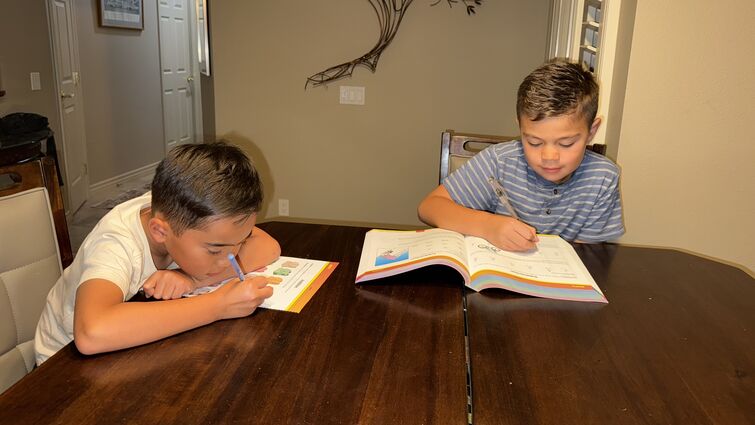
Mason Bui and Logan Chesler work on activity books side by side during summer break, keeping their minds sharp and helping prevent summer brain drain
With school already out and summer in full swing, many parents worry about the "summer slide," when kids lose academic skills during long breaks. Belliny Phaeton, MD, a pediatrician specializing in lifestyle medicine at Loma Linda University Children's Hospital, says now is the time to take action to prevent summer learning loss. She shares practical ways families can keep kids mentally engaged through reading, structured activities, and hands-on learning while also emphasizing the importance of sleep, nutrition, and healthy screen habits.
Q: What are the biggest contributors to summer learning loss?
Some key contributors include excessive screen time, lack of academic engagement, unstructured routines, and home stressors such as socio-economic challenges.
Q: How does screen time during summer break affect cognitive development?
Screen time can impact cognitive development in both positive and negative ways. Educational content can support learning, but excessive or non-educational screen use may hinder problem-solving, focus, impulse control, reduce face-to-face interactions, affect language development, and limit social skills.
Recommendations from experts:
- 18 months & under: Only video chat with an adult.
- 18–24 months: Educational programming with a caregiver.
- Ages 2–5: Limit non-educational screen time to 1 hour/day on weekdays and 3 hours/day on weekends.
- Ages 6 & up: Encourage healthy digital habits and limit passive screen time.
Q: What are simple, age-appropriate ways to keep kids intellectually engaged over the summer?
- Read daily to or with your children using physical books when possible.
- Enroll in programs such as summer learning camps or Bible School.
- Use educational tools, age-appropriate games or educational software
- Encourage hands-on learning through activities such as cooking, gardening, or learning a musical instrument.
Q: How much should kids read each day to maintain literacy skills?
While there's no official guideline from the American Academy of Pediatrics, many experts recommend 15–30 minutes of daily exercise. Regular reading supports literacy, academic performance, and even health outcomes.
Q: Are educational apps or games effective for preventing "brain drain"? What should parents look for?
Yes, they can be helpful. Choose apps that are:
- Age-appropriate
- Interactive and engaging
- Focused on specific learning areas like math or reading
- Balanced in difficulty, not too easy or too hard
Q: Can summer camps or structured activities help maintain learning? What should parents consider?
Absolutely. Camps and structured programs can support learning, build social skills, and offer new experiences.
When choosing a program, ask:
- Is the environment safe and supervised?
- Is the schedule full-day or part-day?
- Does it include physical activity, learning, and fun?
- Will meals be provided?
- How does it fit into your child's overall routine?
Q: Why is maintaining a daily routine important during summer break?
Sometimes parents relax the structure and routines since the children are not going to school. However, children need structure and routine to thrive.
- Sleep schedules – to support physical growth and mental focus
- Meal times – with nutritious foods to fuel the body and brain
- Physical activity – aim for 1 hour per day, ideally outdoors
- Learning time – doesn't have to be academic (cooking, crafts, etc.)
Q: What role does sleep play in learning and development?
Sleep is essential for memory, focus, behavior, and emotional regulation. Without enough sleep, kids struggle with learning and memory retention.
Refer to SleepFoundation.org for recommended sleep durations by age.
Q: What else supports a child's healthy development and learning over the summer?
- Positive relationships – Encourage supportive friendships and adult role models.
- Avoid substance use – Talk openly with kids about avoiding tobacco, alcohol, and marijuana. Start these conversations early, ideally before peer influence begins to take hold.
- Model healthy behavior – Children are more likely to follow your example.
